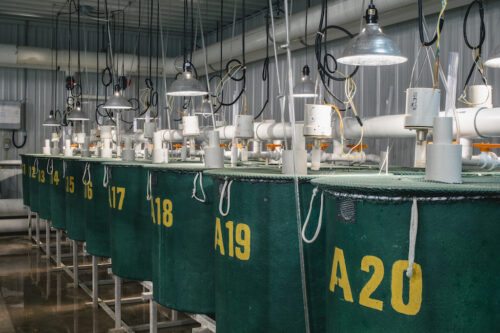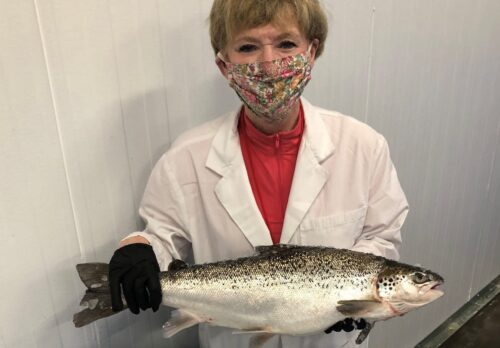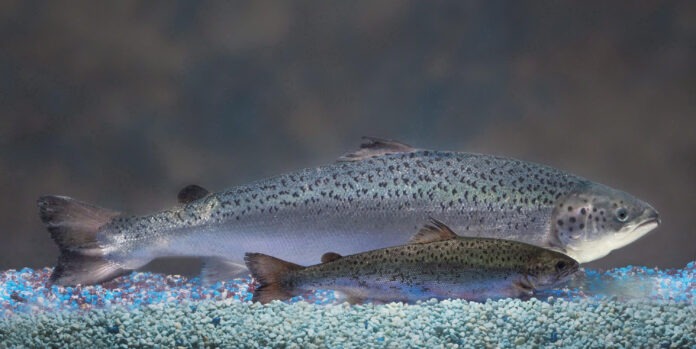The company known for introducing the first genetically modified animal into the US food supply chain says it remains confident about its product after the US Food and Drug Administration (FDA) revisited the approval it gave in 2015.
AquaBounty’s AquAdvantage Salmon was genetically modified to grow faster than conventional salmon (see top photo).
The FDA approved it for sale in the US market in November 2015 after determining it is safe for humans and animals to eat, and after determining that the production of genetically modified eggs at the company’s hatchery in Prince Edward Island, Canada and in Panama (now closed) would have “no effect” on the quality of the human environment in the United States. (Canadian authorities came to the same decision six months later, in May 2016.)

“In the highly unlikely event that any salmon escaped from the facility, the potential for survival would be extremely low,” the FDA said in environmental assessment (EA) approval at that time.
But several organizations questioned FDA’s EA approval and eventually sued. As a result, the Court in the Northern District of California ordered the FDA in December 2019 to do additional analysis and reconsider its “no effect” determination.
Latest developments
On Wednesday, FDA has released for public comment the draft of the amended EA following roughly two years of work.
The revised EA includes, among others, an exhaustive analysis of the likelihood and severity of harms that could occur if AquAdvantage and broodstock escape into the US aquatic environment. It also evaluates the potential pathways for pathogen and parasite transmission from AquAdvantage Salmon and from the production of the salmon at AquaBounty’s facilities on Prince Edward Island to wild fish populations.
“Ultimately, this analysis will aid the Agency in the decision of whether to prepare an environmental impact statement,” the FDA said, adding that a decision will be made after the close of the public comment.
AquaBounty reponds
Sylvia A. Wulf, President & CEO of AquaBounty, said the company is continuing to review FDA’s amended EA.

“In the amended Environmental Assessment released on November 16, the FDA once again concluded there is a ‘negligible likelihood’ that our product would ‘cause significant harms’ or even ‘effects on the environment of the US’,” said Wulf, and reiterated what the company has said all along: “AquaBounty raises fresh Atlantic salmon in a safe, secure, and sustainable way.”
“Our highly controlled land-based farms and robust mitigation measures – already approved by federal regulators and in use without issue in our facilities for over 20 years – help prevent any impacts, however unlikely, to the environment, endangered species, or wild fish populations. Additionally, our AquaBounty production salmon are female, sterile, and unable to reproduce, providing an additional and redundant biological barrier to protect wild salmon,” she said.
“We are confident this process will affirm the extremely low likelihood that our salmon could successfully establish a population in the wild. We look forward to having this matter quickly settled and, in the meantime, we will continue to focus on sharing our sustainable, nutritious salmon with our customers.”









